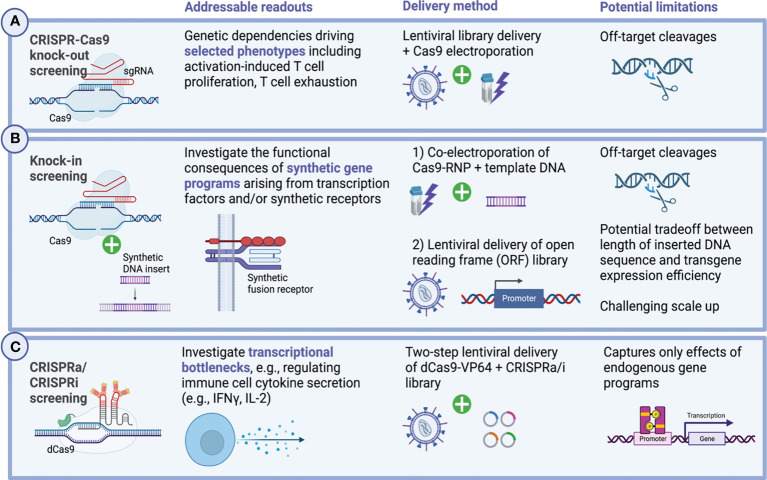Figure 4.
Genome-wide CRISPR screening in primary human immune cells. Forward genetic screening enables the unbiased discovery of genetic dependencies governing cellular functions. Applied to the context of primary immune cells, including genetically engineered immune effector cells, these large-scale discovery approaches have in recent years contributed greatly to develop a deeper understanding of the molecular mechanisms regulating activation-induced T cell proliferation, cytokine secretion and functional exhaustion. Technically, a set of different design approaches exist and enable to address distinct biological questions and confer relationships between genotype and phenotype. (A) Pooled CRISPR/Cas9 knock-out screens allow to interrogate in a massively parallel manner the functional consequences of genetic deletions at genome-scale. In primary human T cells as well as CAR-T cells, lentiviral gRNA library delivery is typically followed by transient Cas9 delivery via electroporation (162–165). Multiple different readouts have previously been investigated including activation-induced T cell proliferation and cytokine secretion as well as T cell persistence and exhaustion. More sophisticated assays combine these efforts with additional selective pressures, for instance, by challenging T cells with immunosuppressive metabolites such as adenosine to select for biologically relevant phenotypes which might inform the design of the next generation of cellular therapies (162–165). (B) Knock-in screens allow the unbiased investigation of novel synthetic gene programs and have lately been translated to primary human T cells in which context they were able to elucidate synthetic fusions receptors which render T cells resistant to immunosuppressive cues from the TME (55, 166, 167). Delivering gene inserts can be accomplished using different strategies, the most recent of which can deliver large transgenes up to multiple kb in size at scale (108, 109). (C) Transcriptional remodeling using CRISPRa and CRISPRi-mediated has successfully been applied to primary human T cells and helped elucidate genetic mechanisms orchestrating cytokine secretion of CD4+ and CD8+ T cells (168). Created with BioRender.com.

